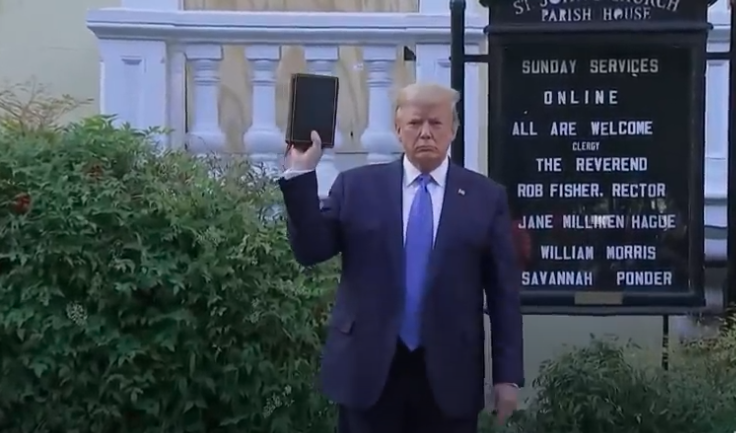
Remember almost four years ago how Trump tweeted how he would fight for the LGBT community? Here is a reminder:
Thank you to the LGBT community! I will fight for you while Hillary brings in more people that will threaten your freedoms and beliefs.
— Donald J. Trump (@realDonaldTrump) June 14, 2016
Then remember when, as the presumptive Republican nominee at the 2016 Republican National Convention, he said he would do everything in his power to protect LGBT citizens?
The fact that President Trump said these things only to turn around and ban transgender individuals from being able to serve in the military showed his true agenda, an agenda that would appease the religious right and serve to disenfranchise the LGBTQ+ citizens of the United States.
GLAAD has a page on its website of all the anti-LGBTQ actions the Trump administration has done since he was inaugurated in January 2017, and it is a very long list.
It comes as no surprise that Trump has not commemorated June as LGBTQ+ Pride month this year nor any previous year under his presidency. It also should not come as a shock that the Department of Justice, led by Attorney General William Barr, submitted a brief to the Supreme Court reasoning that organizations funded by taxpayer money should be allowed to decline to help same-sex couples and others the organizations deem to violate their religious beliefs.
The brief was filed for the case Fulton v. City of Philadelphia, in which a Philadelphia religious nonprofit that operates as a child welfare agency, Catholic Social Services, refused to find homes for adoptive and foster children with same-sex couples which disregards the nondiscrimination ordinance of Philadelphia.
The brief details:
“In accordance with its religious beliefs, Catholic Social Services is willing to provide foster certifications for households headed by married couples or single people, but not households headed by unmarried couples. Because it adheres to the belief that marriage is the union of a man and a woman, it regards all same-sex couples as unmarried. The upshot of those beliefs is that the organization will provide foster certifications for married opposite-sex couples and single, unmarried individuals (including gay and lesbian individuals) but not for same-sex couples or unmarried opposite-sex couples.”
This isn’t the first time Trump’s justice department has submitted a brief to the Supreme Court defending religious beliefs. In September 2017, the Justice Department submitted an amicus brief for Masterpiece Cakeshop v. Colorado Civil Rights Commission, in which Masterpiece owner Jack Phillips refused to make a wedding cake for a same-sex couple because of his beliefs. The court, in 7-2 decision, ruled in favor of Phillips.
While Fulton v. City of Philadelphia will not be heard by the Supreme Court until October, when the next term begins, civil rights activists are weary of the magnitude a ruling in favor of Catholic Social Services.
In an interview with NBC News, Leslie Cooper, ACLU’s LGBT and HIV Project deputy director, explained:
“While this case involves rejecting LGBTQ families, if the Court accepts the claims made in this case, not only will this hurt children in foster care by reducing the number of families to care for them, but anyone who depends on a wide range of government services will be at risk of discrimination based on their sexual orientation, religion or any other characteristic that fails a provider’s religious litmus test.”
Our clients in this case are a child welfare organization and an LGBTQ families organization in Philadelphia. Children and families — not an agency’s religious beliefs — must come first.
— ACLU (@ACLU) June 3, 2020
In the current Supreme Court term, which ends at either the end of June or early July, justices will decide on three cases: Zarda v. Altitude Express, Harris Funeral Homes v. EEOC and Bostock v. Clayton County. These cases will decide if LGBTQ discrimination is considered a type of sex discrimination, which is would be unlawful in the workplace under Title VII of the Civil Rights Act of 1964.
The Justice Department presented briefs which side with employers that wish to discriminate against LGBTQ personnel and argue that Title VII isn’t applicable to LGBTQ employees. If the decision favors LGBTQ workers yet the court’s decision in Fulton v. City of Philadelphia goes in favor of Catholic Social Services’ right to discriminate, the consequences are likely to weaken LGBTQ protections in the workplace thereby giving employers a First Amendment justification to discriminate.
Source: GLAAD, Supreme Court of the United States, NBC News, Washington Blade, ACLU
